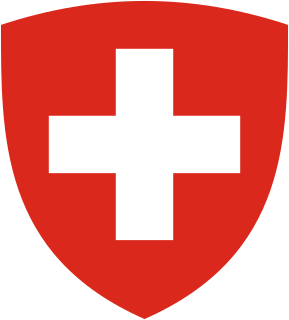 W
WSwitzerland is a semi-direct democratic federal republic. Since 2011 the leading parties are from the right wing. The federal legislative power is vested in the two chambers of the Federal Assembly, the National Council and the Council of States. The Federal Council holds the executive power and is composed of seven power-sharing Federal Councillors elected by the Federal Assembly. The judicial branch is headed by the Federal Supreme Court of Switzerland, whose judges are elected by the Federal Assembly.
 W
WThe Campaign for an Independent and Neutral Switzerland, abbreviated to AUNS, is a political organisation in Switzerland that supports Swiss independence and neutrality.
 W
WCorruption in Switzerland describes the prevention and occurrence of corruption in Switzerland.
 W
WDirect democracy or pure democracy is a form of democracy in which the electorate decides on policy initiatives without legislative representatives as proxies. This differs from the majority of currently established democracies, which are representative democracies. The theory and practice of direct democracy and participation as its common characteristic was the core of work of many theorists, philosophers, politicians, and social critics, among whom the most important are Jean Jacques Rousseau, John Stuart Mill, and G.D.H. Cole.
 W
WEcopop is a Swiss voluntary association established in 1971 dedicated to the preservation of non-renewable resources and the reduction of overpopulation. Ecopop is a member of European Population Alliance.
 W
WElefantenrunde, literally "Elephants' round-table", is a German language term for a television debate in which the leaders of parties with representation in parliament participate. The term originates in Germany and derives from the "weightiness" of the debates' participants and the significance of the event. The word was subsequently adopted in Austria and Switzerland and is currently in use there, but has no uniformly agreed meaning.
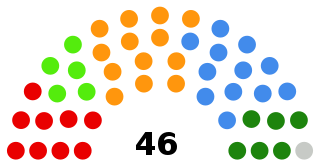 W
WThe Federal Assembly, also known as the Swiss parliament, is Switzerland's federal legislature. It meets in Bern in the Federal Palace.
 W
WThe Federal Constitution of the Swiss Confederation of 18 April 1999 is the third and current federal constitution of Switzerland. It establishes the Swiss Confederation as a federal republic of 26 cantons (states). The document contains a catalogue of individual and popular rights, delineates the responsibilities of the cantons and the Confederation and establishes the federal authorities of government.
 W
WJugendkulturhaus Dynamo, also known as the Drahtschmidli is a youth center in Zürich, Switzerland. The space hosts workshops, concerts, and plays. It also includes a restaurant and club.
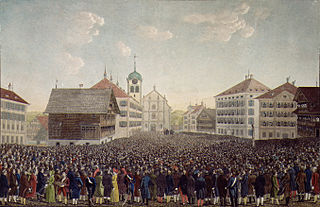 W
WThe Landsgemeinde or "cantonal assembly" is a public, non-secret ballot voting system operating by majority rule, which constitutes one of the oldest forms of direct democracy. Still at use – in a few places – at the subnational political level in Switzerland, it was formerly practiced in eight cantons. For practical reasons, the Landsgemeinde has been abolished at the cantonal level in all but two cantons where it still holds the highest political authority: Appenzell Innerrhoden and Glarus. The Landsgemeinde is also convened in some districts of Appenzell Innerrhoden, Grisons and Schwyz to vote on local questions.
 W
WThis is a list of political parties in Switzerland.
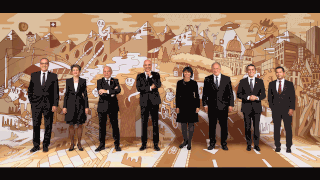 W
WIn Swiss politics, the magic formula is an arithmetic formula for dividing the seven executive seats on the Federal Council among the four coalition parties. The formula was first applied in 1959. It gave the Free Democratic Party, the Catholic Conservative Party and the Social Democratic Party two seats each, while the Party of Farmers, Traders and Independents received one seat.
 W
WOperation Libero is a liberal transpartisan political movement in Switzerland.
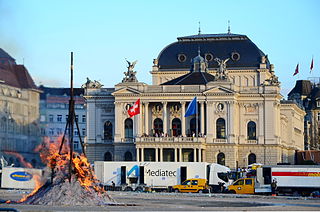 W
WOpernhauskrawalle is the Swiss German term generally used for the youth protests at the end of May 1980 in the Swiss city of Zürich, a municipality in the Canton of Zürich. Also called Züri brännt, these events marked the 'rebirth' of the alternative youth movement in Switzerland in the 1980s.
 W
WRöstigraben is a term used to refer to the cultural boundary between German-speaking and French-speaking parts of Switzerland. There is also a term Polentagraben which refers to the Italian-speaking canton of Ticino.
 W
WSwitzerland made detailed plans to acquire and test nuclear weapons during the Cold War. Less than two weeks after the nuclear bombings of Hiroshima and Nagasaki, the Swiss government started studying the possibility of building nuclear weapons, and continued its military nuclear program for 43 years until 1988. It has since signed and ratified the Treaty on the Non-Proliferation of Nuclear Weapons. Switzerland never possessed biological weapons, but did have a program of the Swiss Army high command to develop and test chemical weapons.
 W
W“What is a Nation?” is an 1882 lecture by French historian Ernest Renan (1823–1892), known for the statements that a nation is "a daily referendum", and that nations are based as much on what the people jointly forget as on what they remember. It is frequently quoted or anthologized in works of history or political science pertaining to nationalism and national identity. It exemplifies a social constructivist understanding of the nation.